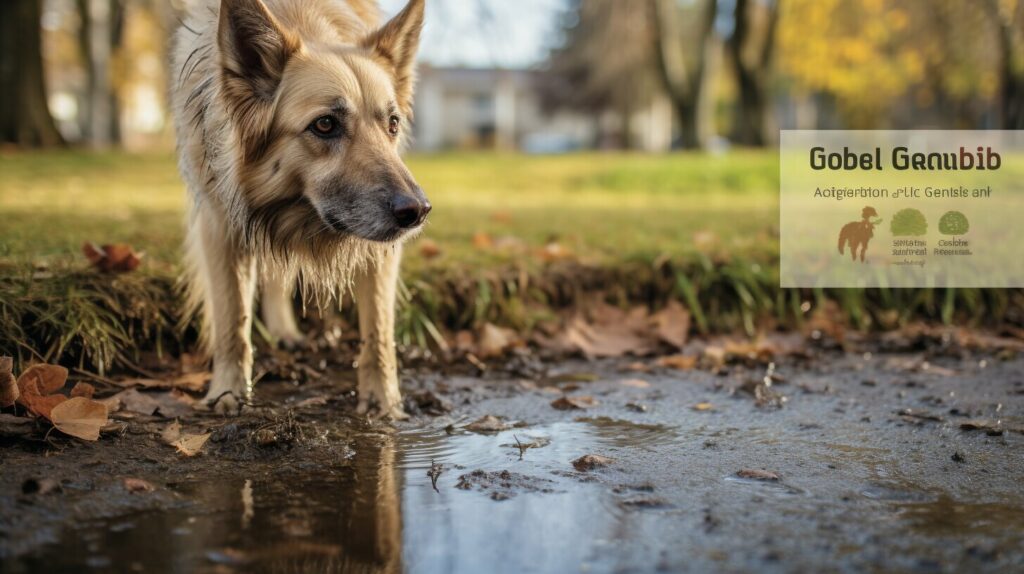As a dog owner, it’s essential to understand the common issues that can affect your furry friend. One of the most prevalent health concerns in dogs is giardia infection. Giardia is a parasite that can cause severe digestive problems and discomfort in dogs, and it’s crucial to be informed and prepared to protect your canine companion.
Key Takeaways:
- Giardia infection is a common issue in dogs
- Early detection and prompt treatment are crucial for dealing with giardia in dogs
- Proper hygiene and preventive measures can reduce the risk of giardia infections in dogs
Recognizing the Symptoms of Giardia in Dogs
Giardia is a common parasite that can infect dogs, and recognizing the symptoms early is crucial to ensuring prompt treatment. The symptoms of giardia in dogs can range from mild to severe, with some dogs displaying no symptoms at all. However, some common symptoms to watch out for include:
- Diarrhea: This is the most common symptom of giardia infection in dogs. The diarrhea can be watery and foul-smelling, and may contain mucus or blood.
- Vomiting: Dogs with giardia may also vomit, especially if the infection has progressed.
- Lethargy: Giardia can cause dogs to become tired and less active than usual.
- Weight loss: If left untreated, giardia can cause dogs to lose weight due to poor nutrient absorption.
It is important to note that these symptoms can also be caused by other health issues, so it is crucial to consult a veterinarian for proper diagnosis. In addition, infected dogs may not show symptoms until several days or even weeks after becoming infected.
When to Consult a Veterinarian
If you suspect your dog may have giardia or is displaying any of the symptoms mentioned above, it is important to contact your veterinarian right away. They can perform various diagnostic tests to determine if your dog has giardia and prescribe the appropriate treatment.
In addition, if your dog has been in contact with other dogs or environments that may be contaminated by giardia, it is recommended to have them tested even if they are not showing any symptoms.
Effective Treatments for Giardia in Dogs
If you suspect that your furry friend has been infected with giardia, it is crucial to seek prompt treatment to prevent further complications. Here are some of the most effective treatments for giardia in dogs:
| Treatment | Description |
|---|---|
| Antibiotics | Antibiotics such as metronidazole and fenbendazole are commonly prescribed to treat giardia in dogs. However, it’s important to follow your vet’s dosage instructions carefully, as overuse or misuse of antibiotics can lead to antibiotic resistance. |
| Probiotics | Probiotics can help restore the balance of good bacteria in your dog’s gut, which can be disrupted by giardia infections. Look for probiotics specifically formulated for dogs and follow the recommended dosage. |
| Herbal remedies | Some pet owners prefer to use natural remedies to treat giardia in dogs, such as grapefruit seed extract or oregano oil. While these remedies can be effective, it’s important to consult with your vet before using them to ensure they are safe and appropriate for your dog. |
It’s important to note that giardia can be difficult to eliminate completely, and reinfection is possible. That’s why it’s crucial to follow your vet’s treatment plan closely, and take preventive measures to minimize the risk of reinfection.
Preventing Giardia Infections in Dogs
Preventing giardia infections in dogs is crucial to maintain their overall health and wellbeing. Here are some measures you can take to reduce the risk of giardia infections:
- Maintain proper hygiene: Clean your dog’s living area regularly and keep them clean. Bathe your dog regularly with a gentle shampoo. Wash your hands thoroughly after handling your dog or their feces.
- Provide clean drinking water: Ensure your dog has access to clean and fresh drinking water at all times. Avoid letting them drink from stagnant water sources, such as puddles or ponds, which may contain giardia parasites.
- Regular deworming: Deworming your dog regularly can help prevent giardia infections. Consult your veterinarian for their recommended deworming schedule, which may vary based on your dog’s age, health, and location.
- Minimize exposure to contaminated environments: Avoid letting your dog play in areas with a high risk of giardia contamination, such as dog parks or poorly maintained kennels. Clean up after your dog promptly and dispose of their feces properly.
By following these preventive measures, you can significantly reduce the risk of your dog contracting giardia infections.
Understanding Giardia Transmission in Dogs
Giardia is a common intestinal parasite that can infect dogs of all ages. The parasite is highly contagious and can be transmitted through a variety of sources.
The most common source of giardia transmission in dogs is through contaminated water. The parasite can survive for long periods of time in wet and moist environments, making it easy for dogs to contract the infection when drinking from or swimming in stagnant water sources.
Another common source of giardia transmission in dogs is through feces. Dogs that come into contact with infected feces, either through direct contact with another infected animal or through contaminated surfaces, can easily contract the parasite.
Direct contact with infected animals is also a significant source of giardia transmission in dogs. This can occur during grooming, playing, or other interactions with infected animals.
In order to reduce the risk of giardia infection in dogs, it is important to practice good hygiene and limit exposure to contaminated environments. This includes providing clean drinking water for your dog, disposing of feces properly, and avoiding areas with high levels of fecal contamination.
If you suspect your dog may have been exposed to giardia or is showing symptoms of infection, it is important to consult a veterinarian for proper diagnosis and treatment.
Diagnostic Testing for Giardia in Dogs
If your dog is showing any symptoms of giardia infection, it is essential to get them tested as soon as possible. There are several diagnostic tests available to confirm the presence of giardia in dogs.
The most common diagnostic test is a fecal examination. A veterinarian will examine a stool sample under a microscope to look for the presence of giardia cysts. However, it is important to note that this test may not always be accurate, as the cysts may not be present in every sample.
Another diagnostic test is the antigen test, which detects the presence of giardia proteins in the dog’s feces. This test is more accurate than a fecal examination and can detect giardia even when cysts are not present in the stool sample.
How to Prepare for Giardia Testing in Dogs
Prior to taking your dog for diagnostic testing, it is important to ensure that they have not been given any medications or supplements that could affect the test results. You should also refrain from giving them any food for at least 12 hours before the test, as this can interfere with the accuracy of the results.
It is recommended to collect a fresh stool sample on the day of the test. You can use a clean plastic bag or container to collect the sample and make sure it is not contaminated with urine or water. Be sure to label the sample container with your dog’s name and the date.
If your dog is diagnosed with giardia, it is important to follow your veterinarian’s treatment plan to ensure a full recovery and prevent the spread of infection to other animals.
The Impact of Giardia Infection on Dog’s Digestive System
Giardia infection in dogs can cause a range of digestive issues, from mild discomfort to severe illness. When the Giardia parasite enters a dog’s digestive system, it can attach to the intestinal lining and cause inflammation, leading to a condition known as giardiasis.
Common symptoms of giardia digestive disorder in dogs include diarrhea, vomiting, and weight loss. These symptoms can appear within a few days of infection and may persist for several weeks or longer if left untreated. In severe cases, dehydration and malnutrition may occur, which can lead to a weakened immune system and other health complications.
It’s crucial to address giardia infection promptly to avoid long-term damage to your dog’s digestive system. Early diagnosis and treatment can help minimize the impact of giardiasis and improve your dog’s overall health. If you suspect your dog may have giardia, it’s essential to consult with a veterinarian for proper testing and treatment.
Key Facts About Giardia Parasites in Dogs
Giardia is a common intestinal parasite found in dogs that can cause serious health issues if left untreated. The giardia parasite in dogs is highly contagious and can spread easily through contaminated water, feces, and direct contact with infected animals. It is important to understand the key facts about giardia parasites in dogs to protect your furry friend.
The giardia parasite has a complex life cycle that involves two stages: the cyst stage and the trophozoite stage. The cysts are tough and can survive outside the dog’s body for extended periods, making them a significant threat to canine health. The giardia parasite can also affect cats, humans, and other animals.
The symptoms of giardia infection in dogs can range from mild to severe and include diarrhea, vomiting, weight loss, and lethargy. In some cases, dogs may not exhibit any symptoms at all. If left untreated, giardia infection in dogs can lead to chronic diarrhea and malnourishment.
The good news is that giardia in dogs is treatable with medication prescribed by a veterinarian. However, it is essential to follow the treatment as directed and continue until the end of the course, even if the symptoms subside early. Improper treatment can lead to a recurrence of the infection and potential drug resistance.
Preventative measures are the best way to keep your dog safe from giardia parasites. These include maintaining good hygiene practices, providing clean drinking water, and regular deworming. Avoid exposing your dog to contaminated environments and other infected animals whenever possible.
In summary, it is crucial to understand the key facts about giardia parasites in dogs to protect your furry friend from this highly contagious and potentially harmful parasite. By staying informed and following preventative measures, you can ensure your dog’s health and wellbeing and prevent the spread of giardia to other dogs and humans.
Conclusion
Caring for your dog can be a rewarding and joyous experience, but it also comes with inherent responsibilities. Giardia is a relatively common issue among dogs, but it doesn’t have to be a cause for alarm. By staying informed and prepared, you can take proactive measures to protect your furry friend from this pesky parasite.
Remember to keep an eye out for common symptoms of giardia infection, such as diarrhea, vomiting, and weight loss. Early detection and prompt treatment are key to minimizing the impact of this parasite on your dog’s health. Be sure to consult with a veterinarian for proper diagnosis and treatment if you suspect your dog may have giardia.
Stay Proactive
Prevention is always better than cure, and this is especially true when it comes to giardia in dogs. By taking simple steps such as ensuring proper hygiene, clean drinking water, and regular deworming, you can greatly reduce the risk of giardia infection in your dog.
Additionally, be mindful of your dog’s surroundings. Avoid exposing them to potentially contaminated environments, and keep a close eye on them during walks and outdoor playtime. By staying vigilant and proactive, you can help ensure the health and wellbeing of your four-legged friend.
Awareness is Key
Gaining a deeper understanding of giardia in dogs is an important part of being a responsible pet owner. By learning more about this parasite, you can take proactive steps to protect your dog’s health and wellbeing.
Remember that accurate diagnostic testing is essential for proper diagnosis and treatment. Understanding the impact of giardia infection on your dog’s digestive system, as well as the life cycle and prevalence of the giardia parasite, can help you take the necessary precautions to prevent infection.
With the right information and precautions, you can help keep your furry friend healthy and happy. So stay informed, stay prepared, and enjoy the many joys of canine companionship!
FAQ
Q: What are the symptoms of giardia infection in dogs?
A: The symptoms of giardia infection in dogs include diarrhea, vomiting, and weight loss.
Q: What are the treatment options for giardia in dogs?
A: Treatment options for giardia in dogs include conventional medications and natural remedies. It is recommended to consult a veterinarian for proper diagnosis and treatment.
Q: How can I prevent giardia infections in my dog?
A: To prevent giardia infections in dogs, practice proper hygiene, provide clean drinking water, and regularly deworm your dog. Minimize exposure to contaminated environments.
Q: How is giardia transmitted among dogs?
A: Giardia can be transmitted among dogs through contaminated water, feces, and direct contact with infected animals. Taking preventive measures can help break the cycle of transmission.
Q: How is giardia diagnosed in dogs?
A: Giardia can be diagnosed in dogs through fecal examinations and antigen tests. Accurate testing is important for proper diagnosis and treatment.
Q: How does giardia infection affect a dog’s digestive system?
A: Giardia infection can affect a dog’s digestive system by disrupting nutrient absorption in the intestines. Prompt treatment is important to mitigate potential long-term consequences.
Q: What are some key facts about giardia parasites in dogs?
A: Giardia parasites have a resilient life cycle and are prevalent among different dog populations. Awareness and proactive measures are crucial to protect dogs from this parasite.



